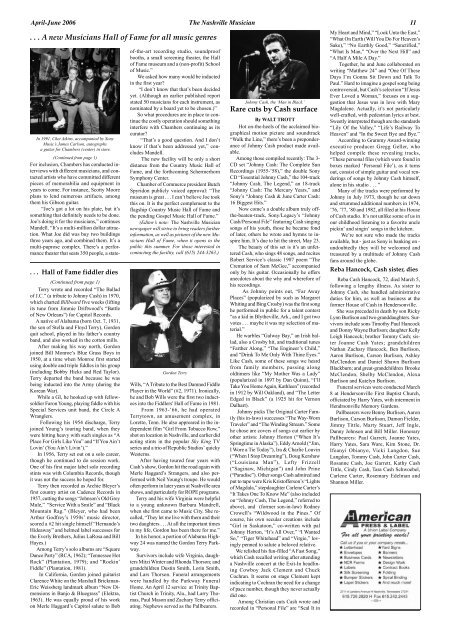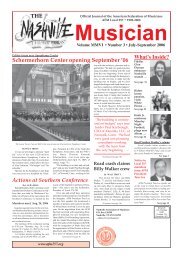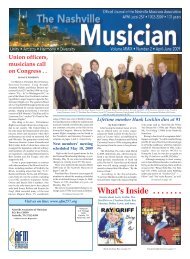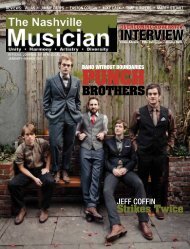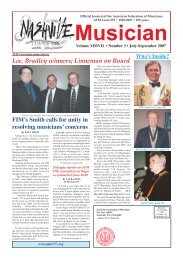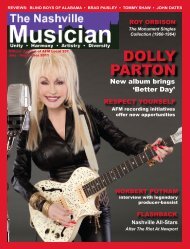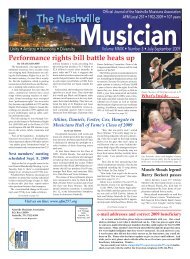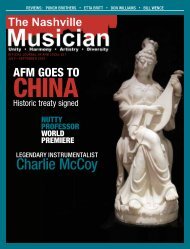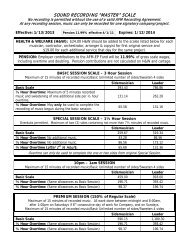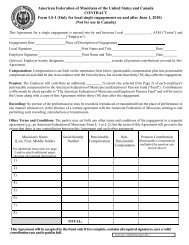Volume MMVI • Number 2 • April-June 2006 - Nashville Musicians ...
Volume MMVI • Number 2 • April-June 2006 - Nashville Musicians ...
Volume MMVI • Number 2 • April-June 2006 - Nashville Musicians ...
Create successful ePaper yourself
Turn your PDF publications into a flip-book with our unique Google optimized e-Paper software.
<strong>April</strong>-<strong>June</strong> <strong>2006</strong> The <strong>Nashville</strong> Musician 11<br />
. . . A new <strong>Musicians</strong> Hall of Fame for all music genres<br />
In 1991, Chet Atkins, accompanied by Sony<br />
Music’s James Carlson, autographs<br />
a guitar for Chambers (center) in store.<br />
(Continued from page 1)<br />
For inclusion, Chambers has conducted interviews<br />
with different musicians, and contacted<br />
artists who have committed different<br />
pieces of memorabilia and equipment in<br />
years to come. For instance, Scotty Moore<br />
plans to lend numerous artifacts, among<br />
them his Gibson guitar.<br />
“Joe’s got a lot on his plate, but it’s<br />
something that definitely needs to be done.<br />
Joe’s doing it for the musicians,” continues<br />
Mandell. “It’s a multi-million dollar attraction.<br />
What Joe did was buy two buildings<br />
three years ago, and combined them. It’s a<br />
multi-puprose complex. There’s a performance<br />
theater that seats 350 people, a state-<br />
. . . Hall of Fame fiddler dies<br />
(Continued from page 1)<br />
Terry wrote and recorded “The Ballad<br />
of J.C.” (a tribute to Johnny Cash) in 1970,<br />
which charted Billboard five weeks (lifting<br />
its tune from Jimmie Driftwood’s “Battle<br />
of New Orleans”) for Capitol Records.<br />
A native of Alabama (born Oct. 7, 1931,<br />
the son of Stella and Floyd Terry), Gordon<br />
quit school, played in his father’s country<br />
band, and also worked in the cotton mills.<br />
After making his way north, Gordon<br />
joined Bill Monroe’s Blue Grass Boys in<br />
1950, at a time when Monroe first started<br />
using double and triple fiddles in his group<br />
(including Bobby Hicks and Red Taylor).<br />
Terry departed the band because he was<br />
being inducted into the Army (during the<br />
Korean War).<br />
While a GI, he hooked up with fellowsoldier<br />
Faron Young, playing fiddle with his<br />
Special Services unit band, the Circle A<br />
Wranglers.<br />
Following his 1954 discharge, Terry<br />
joined Young’s touring band, when they<br />
were hitting heavy with such singles as “A<br />
Place For Girls Like You” and “If You Ain’t<br />
Lovin’ (You Ain’t Livin’).”<br />
In 1956, Terry set out on a solo career,<br />
though he continued to do session work.<br />
One of his first major label solo recording<br />
stints was with Columbia Records, though<br />
it was not the success he hoped for.<br />
Terry then recorded as Archie Bleyer’s<br />
first country artist on Cadence Records in<br />
1957, cutting the songs “Johnson’s Old Grey<br />
Mule,” “Service With a Smile” and “Black<br />
Mountain Rag.” (Bleyer, who had been<br />
Arthur Godfrey’s 1950s’ music director,<br />
scored a #2 hit single himself “Hernando’s<br />
Hideaway” and helmed label successes for<br />
the Everly Brothers, Julius LaRosa and Bill<br />
Hayes.)<br />
Among Terry’s solo albums are “Square<br />
Dance Party” (RCA, 1962); “Tennessee Hot<br />
Rock” (Plantation, 1979); and “Rockin’<br />
Fiddle” (Plantation, 1981).<br />
In California, Gordon joined guitarist<br />
Clarence White on the Marshall Brickman-<br />
Eric Weissberg landmark album “New Dimensions<br />
in Banjo & Bluegrass” (Elektra,<br />
1963). He was equally proud of his work<br />
on Merle Haggard’s Capitol salute to Bob<br />
of-the-art recording studio, soundproof<br />
booths, a small screening theater, the Hall<br />
of Fame museum and a (non-profit) School<br />
of Music.”<br />
We asked how many would be inducted<br />
in the first year?<br />
“I don’t know that that’s been decided<br />
yet. (Although an earlier published report<br />
stated 50 musicians for each instrument, as<br />
nominated by a board yet to be chosen.)”<br />
So what procedures are in place to continue<br />
the costly operation should something<br />
interfere with Chambers continuing as its<br />
curator?<br />
“That’s a good question. And I don’t<br />
know if that’s been addressed yet,” concludes<br />
Mandell.<br />
The new facility will be only a short<br />
distance from the Country Music Hall of<br />
Fame, and the forthcoming Schermerhorn<br />
Symphony Center.<br />
Chamber of Commerce president Butch<br />
Spyridon publicly voiced approval: “The<br />
museum is great . . . I can’t believe Joe took<br />
this on. It is the perfect complement to the<br />
flagship Country Music Hall of Fame and<br />
the pending Gospel Music Hall of Fame.”<br />
(Editor’s note: The <strong>Nashville</strong> Musician<br />
newspaper will strive to bring readers further<br />
information, as well as pictures of the new <strong>Musicians</strong><br />
Hall of Fame, when it opens to the<br />
public this summer. For those interested in<br />
contacting the facility, call (615) 244-3263.)<br />
Gordon Terry<br />
Wills, “A Tribute to the Best Damned Fiddle<br />
Player in the World” (#2, 1971). Ironically,<br />
he and Bob Wills were the first two inductees<br />
into the Fiddlers' Hall of Fame in 1981.<br />
From 1963-’66, he had operated<br />
Terrytown, an amusement complex, in<br />
Loretto, Tenn. He also appreared in the independent<br />
film “Girl From Tobacco Row,”<br />
shot on location in <strong>Nashville</strong>, and earlier did<br />
acting stints in the popular Sky King TV<br />
series and a trio of Republic Studios’ quicky<br />
Westerns.<br />
After having toured four years with<br />
Cash’s show, Gordon hit the road again with<br />
Merle Haggard’s Strangers, and also performed<br />
with Neil Young's troupe. He would<br />
often perform in later years at <strong>Nashville</strong> area<br />
shows, and particularly for ROPE programs.<br />
Terry and his wife Virginia were helpful<br />
to a young unknown Barbara Mandrell,<br />
when she first came to Music City. She recalled,<br />
“They let me live with them and their<br />
two daughters . . . At all the important times<br />
in my life, Gordon has been there for me.”<br />
In his honor, a portion of Alabama Highway<br />
24 was named the Gordon Terry Parkway.<br />
Survivors include wife Virginia, daughters<br />
Mitzi Winter and Rhonda Thorson; and<br />
grandchildren Dustin Smith, Lorin Smith,<br />
and Lars Thorson. Funeral arrangements<br />
were handled by the Parkway Funeral<br />
Home. An <strong>April</strong> 12 service at Trinity Baptist<br />
Church in Trinity, Ala., had Larry Thomas,<br />
Paul Mason and Zachary Terry officiating.<br />
Nephews served as the Pallbearers.<br />
Johnny Cash, the ‘Man in Black.’<br />
Rare cuts by Cash surface<br />
By WALT TROTT<br />
Hot on-the-heels of the acclaimed biographical<br />
motion picture and soundtrack<br />
“Walk the Line,” there’s been a preponderance<br />
of Johnny Cash product made available.<br />
Among those compiled recently: The 3-<br />
CD set “Johnny Cash: The Complete Sun<br />
Recordings (1955-’58),” the double Sony<br />
CD “Essential Johnny Cash,” the 104-track<br />
“Johnny Cash, The Legend,” an 18-track<br />
“Johnny Cash: The Mercury Years,” and<br />
Sony’s “Johnny Cash & <strong>June</strong> Carter Cash:<br />
16 Biggest Hits.”<br />
Now come’s a double album truly offthe-beaten-track,<br />
Sony/Legacy’s “Johnny<br />
Cash/Personal File” featuring Cash singing<br />
songs of his youth, those he became fond<br />
of later, others he wrote and hymns to inspire<br />
him. It’s due to hit the street, May 23.<br />
The beauty of this set is it’s an unfettered<br />
Cash, who sings 48 songs, and recites<br />
Robert Service’s classic 1907 poem “The<br />
Cremation of Sam McGee,” accompanied<br />
only by his guitar. Occasionally he offers<br />
anecdotes about the why and wherefore of<br />
his recordings.<br />
As Johnny points out, “Far Away<br />
Places” (popularized by such as Margaret<br />
Whiting and Bing Crosby) was the first song<br />
he performed in public for a talent contest<br />
“as a kid in Blytheville, Ark., and I got two<br />
votes . . . maybe it was my selection of material.”<br />
He warbles “Galway Bay,” an Irish ballad,<br />
also a Crosby hit, and traditional tunes<br />
“Farther Along,” “The Engineer’s Child,”<br />
and “Drink To Me Only With Thine Eyes.”<br />
Like Cash, some of these songs we heard<br />
from family members, passing along<br />
oldtimers like “My Mother Was a Lady”<br />
(popularized in 1897 by Dan Quinn), “I’ll<br />
Take You Home Again, Kathleen” (recorded<br />
in 1912 by Will Oakland), and “The Letter<br />
Edged in Black” (a 1925 hit for Vernon<br />
Dalhart).<br />
Johnny picks The Original Carter Family<br />
(his in-laws) successes “The Way-Worn<br />
Traveler” and “The Winding Stream.” Some<br />
he chose are covers of songs cut earlier by<br />
other artists: Johnny Horton (“When It’s<br />
Springtime in Alaska”), Eddy Arnold (“Jim,<br />
I Wore a Tie Today”), Ira & Charlie Louvin<br />
(“When I Stop Dreaming”), Doug Kershaw<br />
(“Louisiana Man”), Lefty Frizzell<br />
(“Saginaw, Michigan”) and John Prine<br />
(“Paradise”). Other songs Cash admired and<br />
put to tape were Kris Kristofferson’s “Lights<br />
of Magdala,” stepdaughter Carlene Carter’s<br />
“It Takes One To Know Me” (also included<br />
on “Johnny Cash, The Legend,” referred to<br />
above), and (former son-in-law) Rodney<br />
Crowell’s “Wildwood in the Pines.” Of<br />
course, his own secular creations include<br />
“Girl in Saskatoon,” co-written with pal<br />
Johnny Horton, “It’s All Over,” “I Wanted<br />
So,” “Tiger Whitehead” and “Virgie,” lovingly<br />
penned to salute a beloved relative.<br />
We relished his fun-filled “A Fast Song,”<br />
which Cash recalled writing after attending<br />
a <strong>Nashville</strong> concert at the Exit-In headlining<br />
Cowboy Jack Clement and Chuck<br />
Cochran. It seems on stage Clement kept<br />
indicating to Cochran the need for a change<br />
of pace number, though they never actually<br />
did one.<br />
Among Christian cuts Cash wrote and<br />
recorded in “Personal File” are “Seal It in<br />
My Heart and Mind,” “Look Unto the East,”<br />
“What On Earth (Will You Do For Heaven’s<br />
Sake),” “No Earthly Good,” “Sanctified,”<br />
“What Is Man,” “Over the Next Hill” and<br />
“A Half A Mile A Day.”<br />
Together, he and <strong>June</strong> collaborated on<br />
writing “Matthew 24” and “One Of These<br />
Days I’m Gonna Sit Down and Talk To<br />
Paul.” Hard to imagine a gospel song being<br />
controversial, but Cash’s selection “If Jesus<br />
Ever Loved a Woman,” focuses on a suggestion<br />
that Jesus was in love with Mary<br />
Magdalene. Actually, it’s not particularly<br />
well-crafted, with pedestrian lyrics at best.<br />
Sweetly interpreted though are the standards<br />
“Lily Of the Valley,” “Life’s Railway To<br />
Heaven” and “In the Sweet Bye and Bye.”<br />
According to Grammy Award-winning<br />
executive producer Gregg Geller, who<br />
helped compile these revealing tracks,<br />
“These personal files (which were found in<br />
boxes marked ‘Personal File’), as it turns<br />
out, consist of simple guitar and vocal renderings<br />
of songs by Johnny Cash himself,<br />
alone in his studio . . . ”<br />
Many of the tracks were performed by<br />
Johnny in July 1973, though he sat down<br />
and strummed additional numbers in 1974,<br />
’76, ’77, ’80 and 1982, all filed at his House<br />
of Cash studio. It’s not unlike some of us in<br />
our childhood listening to a favorite uncle<br />
pickin’ and singin’ songs in the kitchen.<br />
We’re not sure who made the tracks<br />
available, but - just as Sony is banking on -<br />
undoubtedly they will be welcomed and<br />
treasured by a multitude of Johnny Cash<br />
fans around the globe.<br />
Reba Hancock, Cash sister, dies<br />
Reba Cash Hancock, 72, died March 5,<br />
following a lengthy illness. As sister to<br />
Johnny Cash, she handled administrative<br />
duties for him, as well as business at the<br />
former House of Cash in Hendersonville.<br />
She was preceded in death by son Ricky<br />
Lynn Burlison and two granddaughters. Survivors<br />
include sons Timothy Paul Hancock<br />
and Donny Wayne Burlison; daughter Kelly<br />
Leigh Hancock; brother Tommy Cash; sister<br />
Joanne Cash Yates; grandchildren<br />
Nathan Zachary Hancock, Ben Burlison,<br />
Aaron Burlison, Carson Burlison, Ashley<br />
McClendon and Daniel Shawn Burlison<br />
Blackburn; and great-grandchildren Brooke<br />
McClendon, Shelby McClendon, Alexa<br />
Burlison and Katelyn Burlison.<br />
Funeral services were conducted March<br />
8 at Hendersonville First Baptist Church,<br />
officiated by Harry Yates, with interment in<br />
Hendrsonville Memory Gardens.<br />
Pallbearers were Benny Burlison, Aaron<br />
Burlison, Carson Burlison, Damon Fielder,<br />
Jimmy Tittle, Marty Stuart, Jeff Ingle,<br />
Danny Johnson and Bill Miller. Honorary<br />
Pallbearers: Paul Garrett, Joanne Yates,<br />
Harry Yates, Sara Ware, Kim Stone, Dr.<br />
Ifeanyi Obianyo, Vicki Langdon, Sue<br />
Langdon, Tommy Cash, John Carter Cash,<br />
Rosanne Cash, Joe Garrett, Kathy Cash<br />
Tittle, Cindy Cash, Tara Cash Schwoebel,<br />
Carlene Carter, Rosemary Edelman and<br />
Shannon Miller.


